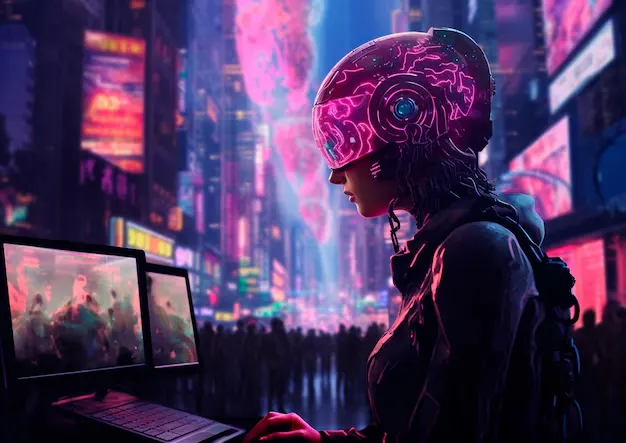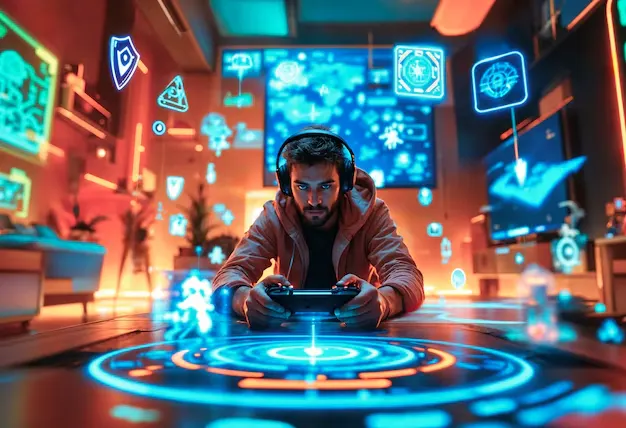Artificial intelligence is revolutionizing gaming in various ways. It makes games more real more smart and more exciting. Through AI, this makes games more immersive by creating game characters with intelligence that behave like a real player would. It enhances the storytelling of games by changing the story based on player choices as well. Game developers are using AI to rapidly create games, debug them and enhance graphics.
Using AI technology generates personalized gaming experiences that you can adjust the game difficulty based on your skills. From complex AI, you will be able to further dive into and experience those little elements of realism, from small chit-chats to the essence of games shortly.
AI in Game Development
AI is making game development faster, cleverer, and more imaginative. These AI-enabled tools enable developers to design graphics, animations, and in-game worlds that are breathtakingly smooth and realistic. These tools have enabled characters, environments, and visual effects to happen faster than ever before. Procedural content generation: AI also plays a critical role in level design and automatically generating challenges. This allows games to offer unique experiences every time a player logs on for a new session.
AI also speeds up the development of a game by helping with coding, debugging, and testing. It simplifies the production chain, enabling devs to work on creativity instead of chores. Finally, the advancement of artificial intelligence technology could further expand the realm of game development, leading to a more immersive and diversified gaming experience.
AI and NPC Behavior
Machine learning is making NPCs (non-player characters) smarter and more interactive. Most modern titles have moved on from the “this cute lady is a trap” route that so often appeared back in the day; NPCs can begin to respond to your choices in this one. They demonstrate a retention of prior conversations, mirroring their behavior and operation. The enemy will employ tactics too, so that makes battles more difficult out there in the field as well. There are already a handful of video games that use AI to adjust a game’s difficulty to a player’s skill so you’re challenged, but not too challenged.
Artificial intelligence makes storytelling richer too by developing relatable, realistic characters. This enriches relationships between players and allows for more fluid storytelling. NPCs will increasingly become higher level, more intelligent, and more responsive to our actions, making the gaming experience feel more organic and engaging.

Personalized Gaming Experiences
Artificial intelligence tailors the ways players experience games. Using data on your previous gambling results, we are guided towards games you would enjoy, courtesy of AI. Other games employ A.I. to customize gameplay based on a player’s unique choices, making the experience more enjoyable and personalized. With AI, it will also be possible to write dynamic storylines, including those dependent on decisions made during gameplay. AI, in some cases, even creates quests, which means a true, ever-evolving, dynamic experience. With the further development of AI, the gameplay experience will be refined to fit every individual’s gameplay style and patterns.
AI in Game Testing and Bug Fixing
AI is redefining how games are tested and refined. This allows game developers to detect and address bugs faster, making games stable and enjoyable. AI can save developers time on testing and allow them to spend more time improving the player experience.
- Game testing is quicker and better with AI as the machines take care of the repeated tasks.
- It can find bugs quickly, reducing the time needed for manual testing.
- Debugging enabled by AI enables developers to address errors more quickly.
- Using AI in testing improves game stability and reduces crashes.
- It helps optimize performance, ensuring smooth gameplay for players.
AI and Cloud Gaming
AI makes cloud gaming faster and more efficient. It also helps minimize lag, letting gamers enjoy a fluid experience even with a slow internet connection. AI also improves graphics by matching settings to the device being used. This enables gamers to play AAA games on smartphones and tablets with low-end PCs. With AI power behind cloud gaming, more gamers can play without high-end hardware. AI is constantly getting better, and cloud gaming will be more accessible and enjoyable for everyone.

Ethical Concerns and Challenges
AI is revolutionizing the gaming industry, but it has certain challenges too. If AI is elevating the quality of a game and taking the user experience to the next level, it does present a few ethical and social implications. Considerations such as privacy, fairness, and the importance of human creativity in game development will require careful attention. While AI offers new opportunities for creative freedom, the output of the game creators needs to be controlled to foster a fair and safe gaming environment.
- Privacy Concerns in AI-Driven Gaming
Artificial intelligence (AI) data collection is used to enhance player experience, but it also raises privacy issues. Some games might track your behavior, preferences, and even your speech or facial features. That data needs to be safeguarded and used responsibly by companies.
- The Risk of AI Replacing Human Creativity
AI can generate characters and worlds and even plots, but it cannot replicate the human imagination. Other games also track user behavior and preferences, even to the point of voice or facial recognition. This is a reminder to companies that they must safeguard player data and utilize it with care.
- Addressing AI Biases in Gaming
AI systems can also show inherent biases, which may result in unfair or unbalanced gameplay. The AI also may, if not properly trained, prefer certain actions or types of characters. It is up to developers to make sure that the AI is fair and that the experience is equal for every player.
The Future of AI in Gaming
Artificial intelligence will transform the gaming industry in many fascinating ways. There has been unprecedented growth in multiple gaming sectors and gaming will keep getting more immersive, interactive, and customized to the player going forward. Through AI, developers will be able to deliver smarter agents, better visuals, and engaging narratives. It will also improve cloud gaming so high-fidelity games can run on any device. In return, as AI technology continues on its journey of evolution, games will react to player decisions like never before. Though it does come with challenges like privacy and fairness for developers, AI does have advantages. Such a reality will, ultimately, create even more immersive and engaging experiences for gamers around the world.

Conclusion
Gaming is experiencing a revolution through AI with greater immersion, intelligence, and dynamics. It makes game development better with realistic characters, intuitive enemies, and rewarding plotlines. AI serves cloud gaming as well, too, enabling gamers to get the same quality of titles on devices. AI enhances interactions and generates realistic environments for virtual and augmented reality.
AI is promising an interesting next step for gaming, but it comes with legal hurdles around privacy, not to mention ethical concerns that may be problematic when played out to their logical conclusions, like eroding human creativity. But, concerns aside, A.I. isn’t going anywhere — look for it to inspire future games to be even better than current games. With the rising technologies, AI-powered gaming will bring gamers immersive experiences and endless opportunities.









